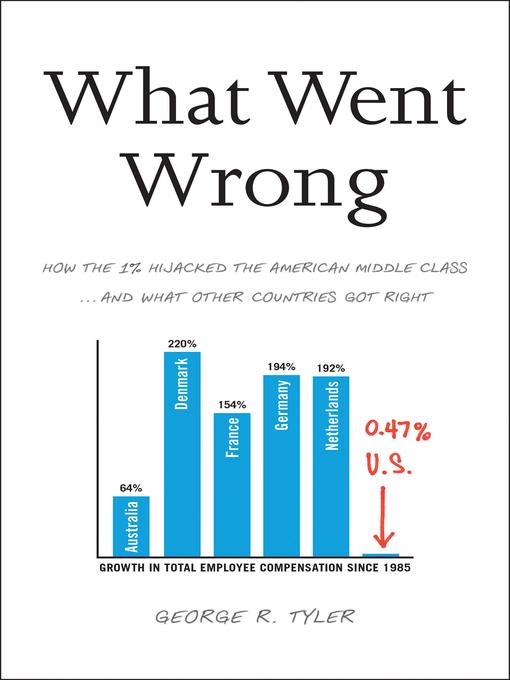
What Went Wrong
How the 1% Hijacked the American Middle Class . . . and What Other Countries Got Right
کتاب های مرتبط
- اطلاعات
- نقد و بررسی
- دیدگاه کاربران
نقد و بررسی

May 27, 2013
In his first book, Tyler, a former Clinton administration deputy assistant Treasury secretary, slams popular acquiescence to low wages, imperious CEOs, and diminished national net worth. He contrasts the pursuit abroad of “family capitalism”—a doctrine of healthy compensation, job retraining, and productivity growth—with the increasing income disparities in the U.S. that destroy economic mobility and perpetuate poverty. Tyler identifies the Reagan era and its free-market dogma as the beginning of the reversal of middle-class growth, but sees little change since then. He argues that a first step toward recovery would be to boost the wages of lower-income households; he cites Australia and Europe as examples showing that prosperity and living wages are complementary, not contradictory. Whatever the merits of his proposals, the array of data he presents justifies popular apprehension about America’s future. The key issue is not big government vs. small government, he maintains, but rather the distribution of wealth. While Tyler’s recommendations seem hard to achieve, he provokes outrage with his impassioned portrait of an America where job security is a relic of the past. Agent: Howard Yoon, Ross Agency.

June 15, 2013
Blame it all on Ronald Reagan--every damn bit of misery and immiseration that has befallen the middle and lower classes in the past three decades. That's the thunder-stealing takeaway of former Treasury Department assistant secretary and World Bank executive Tyler's book. The author charts how a period of unprecedented growth, prosperity and widespread wealth-sharing was derailed under the Reagan administration and continues to careen off the track all these years later. So profound were the changes wrought by privatization and the looting of the public sector that Tyler calls the entire period after 1980 the "Reagan Era"--and he does not mean it as a compliment. According to the author, drawing on thorough economic analysis, "only 5 percent of earners enjoyed income gains exceeding inflation during the Reagan Era, and most of that was concentrated in the earnings of the top 1 percent." Throughout, Tyler explodes numerous myths, though readers will have to know the depth of those myths in order to appreciate his efforts. He observes, for instance, that von Hayek and Keynes, who should be presumed to be mortal enemies, admired each other greatly (and "both men would have been dismayed by the behavior of Ronald Reagan overtly crafting routine, large structural deficits merely to lower taxes on the wealthy"). Demolishing a libertarian plank, the author argues persuasively that there is no real relationship between the minimum wage and unemployment--no reason, in other words, not to pay American workers a living wage. Yet so American workers are paid, with the result that they are ever poorer--and, Tyler argues, "poverty is understated." He recommends a radical overhaul of tax and fiscal systems to follow the model of such nations as Switzerland and Australia. Controversial, of course, but well-grounded in data and fact. Anyone with an interest in economic policy ought to have a look.
COPYRIGHT(2013) Kirkus Reviews, ALL RIGHTS RESERVED.

Starred review from September 15, 2013
Economist Tyler (former Clinton administration deputy asst. Treasury secretary and World Bank advisor) claims that over the last 30 years, productivity and corporate profits have soared in the United States while income levels have stagnated or fallen. To explain why, Tyler compares American "shareholder capitalism" to the "family capitalism" practiced in Australia and Northern Europe, which focuses on increasing the long-term value of businesses for their shareholders and employees. In the post-World War II economic boom (1945-80), a period the author labels the Golden Age, there was an implicit social contract in the United States by which government policy, management, and organized labor worked together to link higher profits and rising productivity with increased wages to ensure that all Americans benefited. Since 1980, Tyler writes, this social contract has been shredded; U.S. politicians and businesses have harmed the population with benefit cuts, deregulation, wage givebacks, and tax policies that transfer wealth from the middle class to the top one percent. VERDICT Tyler's timely and convincing book confirms what Americans feel in their bones: the economy is rigged against them and something is definitely wrong.--Duncan Stewart, Univ. of Iowa Libs., Iowa City
Copyright 2013 Library Journal, LLC Used with permission.

























دیدگاه کاربران